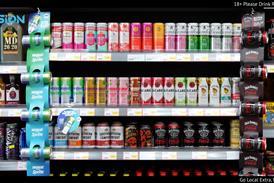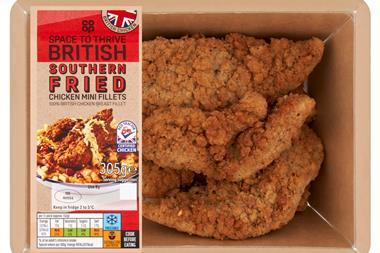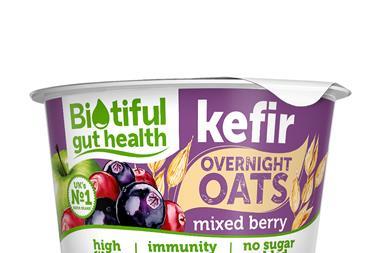Functional food and drinks are in strong growth, but the latest big thing is omega-3.
Asteady stream of products embracing the trend for essential fatty acids have quietly been making their way to market. From yogurts to eggs, more and more products are adding omega-3 fatty acids to regular daily foods, flagging up the benefits of these ‘good fats’ to consumers.
According to the Food Standards Agency, consumers should be eating one portion of oily fish each week to get their recommended dose of omega-3. And in March last year, the Joint Health Claims Initiative ruled that suppliers could use the claim that omega-3 polyunsaturated fatty acids help maintain heart health on packaging and in advertising campaigns.
But while promoters of healthy eating have been spouting the benefits of omega-3 for some time, surveys show that consumers are still not getting enough of it. Primary sources of omega-3 are oily fish such as sardines, mackerel, pilchards, salmon, fresh tuna and trout. But manufacturers are now adding these ‘good fats’ to everyday products to help consumers boost their consumption.
Müller, for example, is backing its new omega-3 products with a £10m marketing campaign. The company’s Müller Vitality brand has become the first range of functional yogurts and yogurt drinks to be boosted with the benefits of omega-3 fatty acids. The range comprises a six pack of 100g yogurt drinks with a rrp of £1.68; a 750g yogurt drink in strawberry or orange (rrp £1.68); and a six pack of 150g yogurt pots for £1.98.
St Ivel Gold has added an omega-3 product to its range of spreads. The product contains the long-chain variety of omega-3, which is thought to be 10 times more effective than the short chain form that is contained in many other health spreads on the market.
St Ivel Gold Omega-3 is low in fat, low in saturated fat, is trans-fat free, and is a source of vitamins A, D, E and B12. Available now, the product will be supported by a £4m marketing campaign.
Meanwhile, Yeo Valley Organic’s new Inner Balance range of yogurts are also rich in omega 3 and 6, as well as fibre, minerals and other vitamins. The range of three products are low in fat, are probiotic and enriched with five seeds and grains, including sunflower, pumpkin and golden linseed.
Fish brand Young’s is highlighting an omega 3 claim on its new chilled meals. The first three products in the range - lemon & pepper salmon, salmon fillets with Mediterranean dressing, and smoked mackerel crisp bakes - offer between two-thirds and 100% of the recommended weekly intake of omega 3, which is 3g.
The trend has also led to the launch of the Sparky brand, a new range of food and drink products rich in omega 3. The range includes chicken, bread, and juices.
FUNCTIONAL FOODS
While omega-3 is the latest to join the functional foods trend, products with wider health benefits are continuing to hit the market. The Benecol brand of cholesterol-lowering foods has been reformulated to reduce the saturated fat content and increase the level of mono-unsaturated fat.
And earlier this year it launched One-a-Day Yogurts in peach and strawberry flavour twin-packs, offering consumers an easy way to lower cholesterol.
Juice brand Tropicana has also teamed up with Benecol to launch a range of juices to help with cholesterol reduction. The Tropicana Essentials with Benecol range comprises: Multivitamins - a blend of 12 juices with five extra vitamins for a healthy body; Calcium - orange juice with added calcium for healthy bones and teeth; and Fibre, four fruits and carrot juice with extra fibre for inner health. Rrp is £2.49 for a 1ltr carton.
Continuing the heart health functionality, cholesterol charity Heart UK has officially recognised Welch’s purple grape juice for its antioxidant properties and role in promoting heart health. The juice has a rrp of £1.99 for a 1ltr carton. Pomegreat, the pomegranate juice drink, is also approved by Heart UK for its high antioxidant levels. Pomegreat original, Pomegreat & blueberry and Pomegreat & raspberry come in 1ltr cartons with a rrp of £1.39.
Sirco is another heart health drink. Launched in November in 1ltr cartons, but due to roll out later in the year in 250ml cartons, Sirco is again approved by Heart UK. The drink contains Fruitflow, a bioactive extract from tomatoes that helps to keep the blood healthy and comes in two flavours - blueberry & apple and orange.
Del Monte, meanwhile, has also moved into the functional market with the introduction of Healthy Plus orange juice with added vitamins. With a rrp of 99p for one litre, the new product contains vitamins A, C and E, plus citrus bioflavonoids.
Soya is also deemed to have cholesterol-lowering properties, and, according to a report published in 2004 by Mintel, soya dairy-alternative is the fastest growing sector of the functional food and drinks market. Soya milk brand Alpro has this year launched Alpro Soya Light, which has just 1.2% fat and added calcium and vitamins, as well as a Dairy Free Chocolate Shake. Soya Light has a rrp of £1.39 for a ltr carton, while the chocolate milkshake comes in a 500ml bottle with a rrp of 99p.
The functional sector has also started to make an impact on traditionally ‘unhealthy’ markets. Belgian chocolate company NewTree has come up with a range of chocolate products with added health benefits.
The range of nine 80g chocolate bars includes Digest, a lemon-flavoured dark chocolate with cactus extract which helps prevent the uptake of calories by the body.
While functional food and drinks are in growth - the market value in 2003 was six times that of the sector in 1998 - a report by Datamonitor claims that there is an element of distrust in functional foods across Europe, with more than six in 10 consumers not believing food and drink health claims.
John Band, consumer markets analyst at Datamonitor, says: “Unless companies make labelling clearer and more believable, most people will never make the switch to functional food and drinks.”
But he also forecasts that sales in the UK will grow 32% by 2009. “In the future, consumers will increasingly need sustainable nutrition, both in terms of weight maintenance and in terms of providing nutrients. This is certain to mean that we will eat more functional food and drinks.”
JARGON BUSTER
CITRUS BIOFLAVONOIDS: help maintain the health of capillaries and blood vessels, and enhance the function of vitamin C. Bioflavanoids are also required by the body to aid in resistance to infection and to prevent oxidation of vitamin C within the body.
OMEGA-3: a long-chain essential fatty acid found in oily fish and eggs that improves heart health.
OMEGA-6: an essential fatty acid in ample supply of which excessive intake can cause increased water retention, raised blood pressure and blood clotting. Found in sunflower, sesame and evening primrose oils, among others.
PLANT CHEMICALS/STEROLS: found in margarines such as Benecol and Flora Proactive, sterols are not absorbed by the gut and can inhibit the absorption of cholesterol.
PRO-BIOTIC BACTERIA: a ‘live’ supplement that improves the balance of bacteria in the gut to reduce the risk of disease.
PRE-BIOTIC BACTERIA: a food that isn’t digested by the body but stimulates the growth of bacteria in the colon to improve health.
Asteady stream of products embracing the trend for essential fatty acids have quietly been making their way to market. From yogurts to eggs, more and more products are adding omega-3 fatty acids to regular daily foods, flagging up the benefits of these ‘good fats’ to consumers.
According to the Food Standards Agency, consumers should be eating one portion of oily fish each week to get their recommended dose of omega-3. And in March last year, the Joint Health Claims Initiative ruled that suppliers could use the claim that omega-3 polyunsaturated fatty acids help maintain heart health on packaging and in advertising campaigns.
But while promoters of healthy eating have been spouting the benefits of omega-3 for some time, surveys show that consumers are still not getting enough of it. Primary sources of omega-3 are oily fish such as sardines, mackerel, pilchards, salmon, fresh tuna and trout. But manufacturers are now adding these ‘good fats’ to everyday products to help consumers boost their consumption.
Müller, for example, is backing its new omega-3 products with a £10m marketing campaign. The company’s Müller Vitality brand has become the first range of functional yogurts and yogurt drinks to be boosted with the benefits of omega-3 fatty acids. The range comprises a six pack of 100g yogurt drinks with a rrp of £1.68; a 750g yogurt drink in strawberry or orange (rrp £1.68); and a six pack of 150g yogurt pots for £1.98.
St Ivel Gold has added an omega-3 product to its range of spreads. The product contains the long-chain variety of omega-3, which is thought to be 10 times more effective than the short chain form that is contained in many other health spreads on the market.
St Ivel Gold Omega-3 is low in fat, low in saturated fat, is trans-fat free, and is a source of vitamins A, D, E and B12. Available now, the product will be supported by a £4m marketing campaign.
Meanwhile, Yeo Valley Organic’s new Inner Balance range of yogurts are also rich in omega 3 and 6, as well as fibre, minerals and other vitamins. The range of three products are low in fat, are probiotic and enriched with five seeds and grains, including sunflower, pumpkin and golden linseed.
Fish brand Young’s is highlighting an omega 3 claim on its new chilled meals. The first three products in the range - lemon & pepper salmon, salmon fillets with Mediterranean dressing, and smoked mackerel crisp bakes - offer between two-thirds and 100% of the recommended weekly intake of omega 3, which is 3g.
The trend has also led to the launch of the Sparky brand, a new range of food and drink products rich in omega 3. The range includes chicken, bread, and juices.
FUNCTIONAL FOODS
While omega-3 is the latest to join the functional foods trend, products with wider health benefits are continuing to hit the market. The Benecol brand of cholesterol-lowering foods has been reformulated to reduce the saturated fat content and increase the level of mono-unsaturated fat.
And earlier this year it launched One-a-Day Yogurts in peach and strawberry flavour twin-packs, offering consumers an easy way to lower cholesterol.
Juice brand Tropicana has also teamed up with Benecol to launch a range of juices to help with cholesterol reduction. The Tropicana Essentials with Benecol range comprises: Multivitamins - a blend of 12 juices with five extra vitamins for a healthy body; Calcium - orange juice with added calcium for healthy bones and teeth; and Fibre, four fruits and carrot juice with extra fibre for inner health. Rrp is £2.49 for a 1ltr carton.
Continuing the heart health functionality, cholesterol charity Heart UK has officially recognised Welch’s purple grape juice for its antioxidant properties and role in promoting heart health. The juice has a rrp of £1.99 for a 1ltr carton. Pomegreat, the pomegranate juice drink, is also approved by Heart UK for its high antioxidant levels. Pomegreat original, Pomegreat & blueberry and Pomegreat & raspberry come in 1ltr cartons with a rrp of £1.39.
Sirco is another heart health drink. Launched in November in 1ltr cartons, but due to roll out later in the year in 250ml cartons, Sirco is again approved by Heart UK. The drink contains Fruitflow, a bioactive extract from tomatoes that helps to keep the blood healthy and comes in two flavours - blueberry & apple and orange.
Del Monte, meanwhile, has also moved into the functional market with the introduction of Healthy Plus orange juice with added vitamins. With a rrp of 99p for one litre, the new product contains vitamins A, C and E, plus citrus bioflavonoids.
Soya is also deemed to have cholesterol-lowering properties, and, according to a report published in 2004 by Mintel, soya dairy-alternative is the fastest growing sector of the functional food and drinks market. Soya milk brand Alpro has this year launched Alpro Soya Light, which has just 1.2% fat and added calcium and vitamins, as well as a Dairy Free Chocolate Shake. Soya Light has a rrp of £1.39 for a ltr carton, while the chocolate milkshake comes in a 500ml bottle with a rrp of 99p.
The functional sector has also started to make an impact on traditionally ‘unhealthy’ markets. Belgian chocolate company NewTree has come up with a range of chocolate products with added health benefits.
The range of nine 80g chocolate bars includes Digest, a lemon-flavoured dark chocolate with cactus extract which helps prevent the uptake of calories by the body.
While functional food and drinks are in growth - the market value in 2003 was six times that of the sector in 1998 - a report by Datamonitor claims that there is an element of distrust in functional foods across Europe, with more than six in 10 consumers not believing food and drink health claims.
John Band, consumer markets analyst at Datamonitor, says: “Unless companies make labelling clearer and more believable, most people will never make the switch to functional food and drinks.”
But he also forecasts that sales in the UK will grow 32% by 2009. “In the future, consumers will increasingly need sustainable nutrition, both in terms of weight maintenance and in terms of providing nutrients. This is certain to mean that we will eat more functional food and drinks.”
JARGON BUSTER
CITRUS BIOFLAVONOIDS: help maintain the health of capillaries and blood vessels, and enhance the function of vitamin C. Bioflavanoids are also required by the body to aid in resistance to infection and to prevent oxidation of vitamin C within the body.
OMEGA-3: a long-chain essential fatty acid found in oily fish and eggs that improves heart health.
OMEGA-6: an essential fatty acid in ample supply of which excessive intake can cause increased water retention, raised blood pressure and blood clotting. Found in sunflower, sesame and evening primrose oils, among others.
PLANT CHEMICALS/STEROLS: found in margarines such as Benecol and Flora Proactive, sterols are not absorbed by the gut and can inhibit the absorption of cholesterol.
PRO-BIOTIC BACTERIA: a ‘live’ supplement that improves the balance of bacteria in the gut to reduce the risk of disease.
PRE-BIOTIC BACTERIA: a food that isn’t digested by the body but stimulates the growth of bacteria in the colon to improve health.























No comments yet